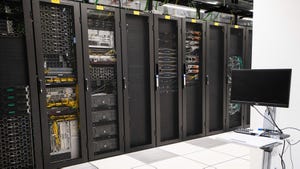Microsoft Ignite 2024: New Azure Data Center Chips UnveiledMicrosoft Ignite 2024: New Azure Data Center Chips Unveiled
In addition to the new security and DPU chips, Microsoft has launched new Azure cloud services powered by Nvidia and AMD hardware.

One year after introducing its own in-house AI accelerator and CPU, Microsoft has announced it will install two more custom chips into its Azure data centers that will improve the performance and security of its cloud services, the company said today (November 19).
At the Microsoft Ignite conference in Chicago, the tech giant announced the Azure integrated Hardware Security Module (HSM), its newest in-house cloud security chip, which hardens key management and allows encryption and signing keys to remain within the chip.
Microsoft also announced the Azure Boost DPU, the company’s first in-house data processing unit, which offloads networking and storage management and includes data accelerators and security features to lighten the load on CPUs.
“What it means to the end user is your applications and your operating environments are more secure, and they run faster,” said Matt Kimball, vice president and principal analyst at Moor Insights & Strategy.
With the two new in-house chips, Microsoft continues its effort to optimize its infrastructure and environment to meet the needs of their customers’ AI, analytics, and other data-driven needs, he said.

Azure integrated Hardware Security Module (HSM) is the company’s newest in-house cloud security chip (Image: Microsoft)
Hyperscalers Roll the Dice on Custom Chips
At last year’s Ignite conference, Microsoft announced the Microsoft Azure Maia AI Accelerator to power both AI training and inferencing workloads in the cloud, and the Cobalt 100 CPU, an Arm-based processor that’s energy efficient and provides good performance-per-watt for general-purpose workloads.
Microsoft initially launched the two processors in early 2024 to power Microsoft services, such as Microsoft Copilot and Azure OpenAI Service. Last month, in October, Azure announced the general availability of Cobalt 100-based virtual machines to customers.
Azure and other hyperscale cloud service providers like Amazon Web Services (AWS), Google Cloud, and Meta are finding it advantageous and cost-effective to build their own custom chips to power their own data centers and provide cloud services to their customers. But the cloud providers continue to work with large chipmakers such as Nvidia, AMD, and Intel.
At Microsoft Ignite, the company announced new cloud services that will be powered by Nvidia’s next-generation Blackwell GPU and a custom AMD Epyc processor.
Azure’s AI Supercomputer and HPC Cloud Services
Microsoft announced that it is working to bring online an AI supercomputing cloud service that will be powered by Nvidia’s AI systems running Nvidia’s GB200 Grace Blackwell Superchip.
More specifically, Microsoft said the cloud service – Azure ND GB200 v6 – will offer AI-optimized virtual machines that combines the Nvidia GB200 NVL 72 rack-scale design with Quantum InfiniBand networking to connect tens of thousands of Blackwell GPUs to deliver AI supercomputing performance to customers.
Microsoft said it is beginning to bring the systems online and co-validating and co-optimizing them with Nvidia and others. The company essentially announced the preview of the Blackwell-powered cloud service, but didn’t state when the preview will be available to customers.
Still, analysts said the news is significant because it signals that the Blackwell GPU will soon be available in the market.
“Everyone is going to try to be offering Blackwell services. It is a significant jump in performance over the previous generation,” said Jim McGregor, principal analyst and partner at Tirias Research.
Microsoft also announced a new high-performance computing (HPC) cloud service that will be powered by custom AMD Epyc 9V64H processors that will only be available on Azure.
The custom AMD chip, built on Zen4 cores, features high-bandwidth memory that provides up to eight times higher performance than other bare metal and cloud alternatives and performs up to 35 times faster than legacy on-premises systems, Microsoft said. The new Azure HBv5 VMs will be available for preview in 2025.
Kimball, the analyst, said the custom AMD chip is designed to meet the power and performance requirements that are unique to Azure. But while the chip is unique to Azure, the practice of a chipmaker taking one of its CPUs and delivering significant customization to cloud providers is not unique, Kimball said.
Intel develops custom chips for AWS, for example. In fact, the two companies recently announced a new, multi-year, multi-billion partnership in which Intel will produce a custom AI fabric chip and a custom Xeon 6 chip for AWS.
Chipmakers building custom chips for cloud service providers is a growing trend that will continue in the years to come, McGregor said.
More Details on Azure’s New Security Chip and DPU
Microsoft said it will install the Azure Integrated HSM security chip in every new server in Microsoft’s data centers, beginning in 2025.
Azure Integrated HSM works with an entire Azure security stack to deliver deep, end-to-end security, Kimball said. Azure previously built two other security chips: Project Cerebrus, which provides a root of trust that ensures a secure boot environment; and Azure Security Services, which handles authentication and attestation, which makes sure the hardware and associated software, such as drivers, are genuine and not tampered with.
“The new HSM security chip is used to manage cryptographic functions and keep them all bound in this secure, trusted environment,” Kimball said.
Read more of the latest cloud computing news
AWS and Google Cloud have also built their own in-house security chips, the analyst added. AWS’ Nitro Security Chip and Google Cloud’s Titan “all vary in scope of function, but the underlying concept is the same: deliver an entirely secure operating and data environment for the millions of users who consume their services.”
As for the Azure Boost DPU, Microsoft said it expects its DPU-equipped servers on Azure will run cloud storage workloads at three times less power and four times the performance compared to existing servers.
McGregor said it is advantageous for users to use a DPU.
“Having that offload capability for networking and for storage for different types of applications can improve the efficiency of the servers. So, what you are actually running on the GPUs and CPUs on the Azure cloud is going to run more efficiently,” the Tirias analyst noted.
Azure Local Replaces Azure Stack HCI
In other news, Microsoft today also announced a new Azure Local infrastructure solution that replaces the Azure Stack family.
Azure Stack HCI (hyperconverged infrastructure) equipment is on-premises hardware that allows enterprises to run workloads in-house while connecting to Azure cloud services.
Microsoft said Azure Local is a cloud-controlled, hybrid infrastructure platform enabled by Azure Arc, which connects on-premises environments to the Azure cloud. Existing Azure Stack HCI customers will automatically upgrade to Azure Local, the company said.
On the AI front, the company announced new capabilities in Azure AI Foundry, where organizations can design, customize, and manage their AI apps and agents.
The company said that the new capabilities include Azure AI Foundry SDK, now in preview, that will provide a unified toolchain for customizing, testing, deploying, and managing AI apps and agents.
Read more about:
Chip WatchAbout the Author
You May Also Like









